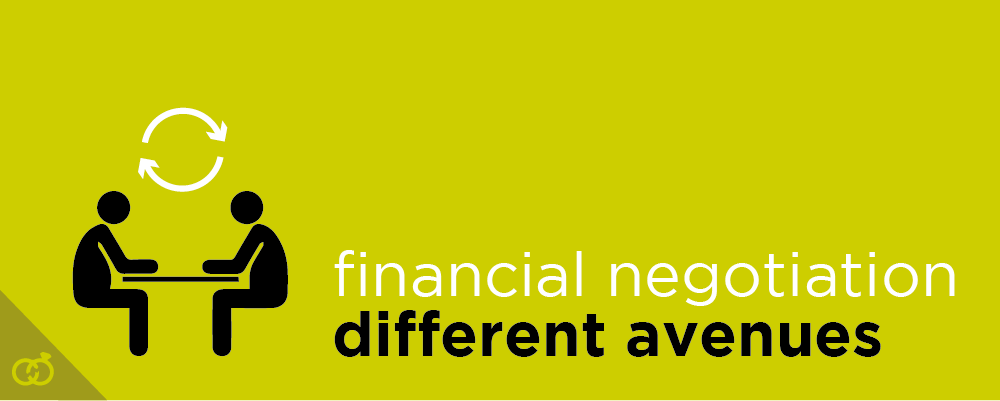- Basildon 01268244144
- Chelmsford 01245453800
- Colchester 01206217300
- London 020 4586 1280

The negotiation surrounding divorce and finances can be one of the most difficult parts of the process. Spouses and former spouses have a number of financial claims that they can make against one another.
Some spouses and former spouses may opt to resolve financial arrangements prior to commencing the divorce process, doing this during, and after the divorce has been completed.
In some instances, parties may already have prenuptial (prenups) or postnuptial agreements which they can rely upon and/or may be of assistance when settling finances.
In other instances, parties may find themselves engaged in negotiation to attempt to settle matters.
Whilst ultimately one or the other spouse may consider making a court application, it should be kept in mind that the Family Court is considerably overstretched.
Part of our aim this year in Good Divorce Week is to make people aware that there continues to be a severe backlog of cases yet to be dealt with in the courts. Parties to family law cases are frequently waiting several months to secure a court hearing date.
Against the backlog of the delays, parties are encouraged to, where possible, find and engage in alternative avenues to negotiate a financial settlement.
Where parties are represented and require representation at a court hearing, it should be kept in mind that this only adds to costs being incurred by both parties. Ultimately (unless in exceptional circumstances), parties shall not be able to recuperate.
Spouses and former spouses may find the following avenues helpful when engaging in negotiation to settle finances:
Direct discussions – where possible, spouses are encouraged to engage with one another and provide full and frank disclosure of their financial circumstances. Keeping a challenge of communication open is important. It would benefit one or both spouses to obtain independent legal advice to guide them through their rights, obligations and possible outcomes;
Mediation – a mediator’s role is to assist the parties in the resolution of disputes or to assist them as far as possible to narrow down the issues. A mediator is to be impartial and cannot provide either party with legal advice. Discussions in mediation are on a “without prejudice” basis and are subject to legal advice. That said, spouses may find it helpful to have the assistance of a third person to guide them through the information that they are to provide one another and some possible outcomes;
Voluntary Disclosure through solicitors – this involves one spouse or indeed, both, engaging separate solicitors to assist them with the collation of information and documents for simultaneous exchange with one another. Following the exchange, spouses may consider whether there is further and/or additional information or documents required by way of a clarification and may commence the process of negotiating a settlement. Whilst there may be offers and counteroffers made, negotiation through such method is often helpful for spouses as they have the benefit of legal advice running alongside the making or considering of an offer to settle;
Collaborative process – this is a form of alternative dispute resolution where each spouse appoints their own specialist collaboratively trained lawyer who then works together to assist spouses in reaching a resolution. Meetings are often face-to-face. The aim is to reach an agreement without the recourse of having to make a Court application. Within this process, spouses and former spouses will have exchanged their respective financial information; and
Arbitration – this is another form of alternative dispute resolution where in addition to instructing solicitors, the spouses jointly appoint and are then bound by the decision of the arbitrator. Where it is looking more likely that the spouses are unable to negotiate the settlement utilising other avenues and likely that they require the court’s assistance, an arbitration process allows the parties to have a determination sooner than may be achieved by utilising the court process. Such a process does however involve the agreement of both spouses to engage in arbitration and to meet the arbitrator’s costs jointly.
During Good Divorce Week 2022, Resolution and its members are raising awareness of the Family Court crisis. There is a large and growing backlog of cases currently being dealt with by an over-stretched Family Court system. All of our solicitors are members of the group Resolution. Collectively we strive to resolve matters in a constructive and non-confrontational manner as we work towards an amicable divorce.
Typical UK divorce has changed with the addition of no-fault divorce. Should you wish to discuss issues concerning divorce, children or finances, please do not hesitate to contact me. You can call me on 01268 824938 or contact me via email at muntech.kaur@birkettlong.co.uk.
Are you looking for the best divorce lawyer near you? Check out our reviews on Review Solicitors.



Comments